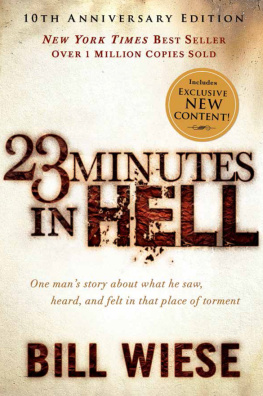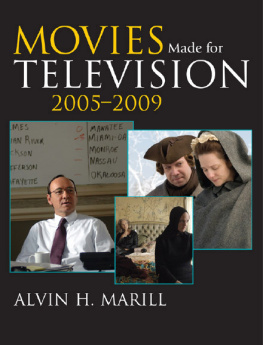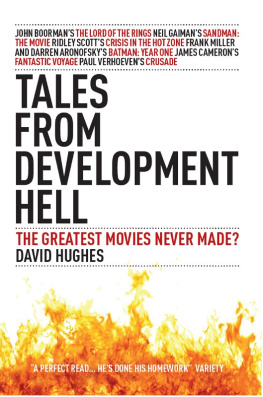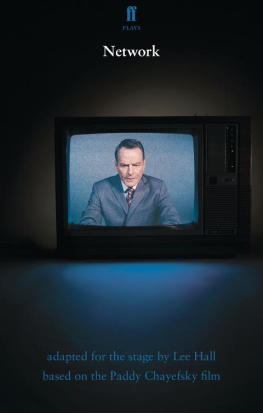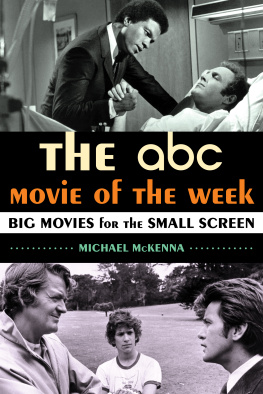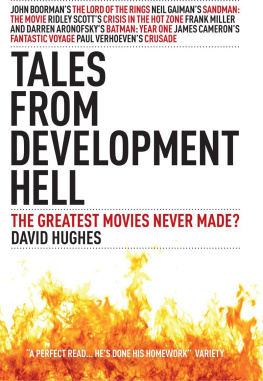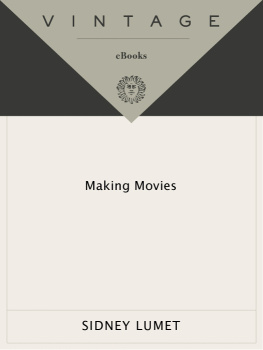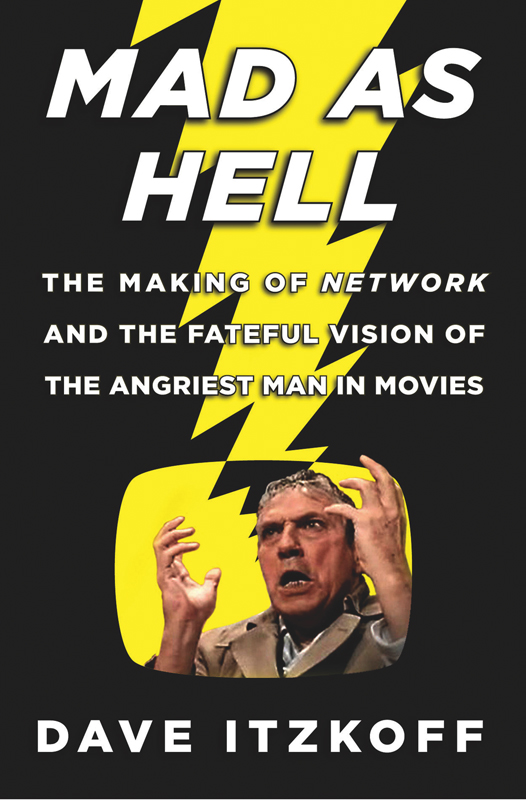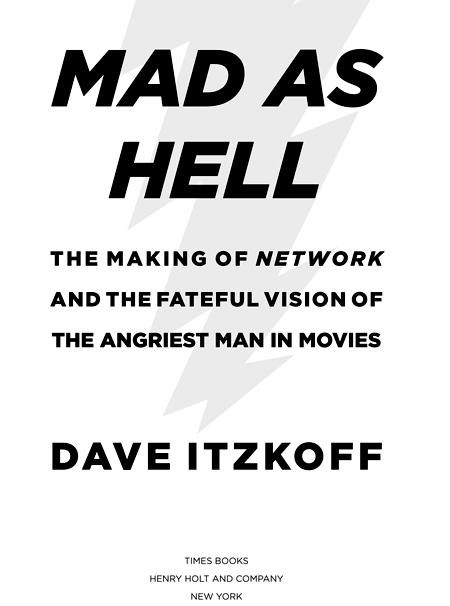
The author and publisher have provided this e-book to you for your personal use only. You may not make this e-book publicly available in any way. Copyright infringement is against the law. If you believe the copy of this e-book you are reading infringes on the authors copyright, please notify the publisher at: us.macmillanusa.com/piracy.
For Amy, who makes me happy as hell
Contents
Slowly, the world were living in is getting smaller, and all we say is, Please, at least leave us alone in our living rooms. Let me have my toaster and my teevee and my steel-belted radials and I wont say anything. Just leave us alone.
Well, Im not going to leave you alone.
I want you to get mad .
H OWARD B EALE , Network
PROLOGUE
He was at his best when he was angry. It wasnt simply that so many things bothered him, or that when they did, they irritated him to the fullest possible degree. But where others avoided conflict, he cultivated it and embraced it. His fury nourished him, making him intense and unpredictable, but also keeping him focused and productive. He was not generally the sort of person who felt the need to clench his fists in violence or submerge his sorrows in drink. But he knew what it was like to have desires and see them denied; he knew how it felt to cry out and not be heard. His outrage simmered in his spleen and surged through his veins, collecting in his fingertips until it pushed his pen across paper and punched the keys of his typewriter. He wrestled his rancor into words and sentences and speeches. When Paddy Chayefskys characters spoke, they spoke with his aggravated, articulate voice, and yet they seemed to speak for everyone.
While his career was in ascendance, he was hailed as the dramatist of the common man, whose ear for the language of the underclass was so uncanny that it was said he must have transcribed it from a tape recorder. His best-known characters were thwarted people who feared nothing so much as unfulfillment, whose most emphatic and memorable dialogue poured out of them in aggressive bursts, arriving in explosive climaxes after scene upon scene of unvoiced frustration and unresolved conflict. Whether he was imagining the inner life of a lowly, lovelorn butcher or the impotent chief of medicine at a major metropolitan hospital, Chayefsky could relate to these men. Their struggle for even a minimal amount of autonomy mirrored their creators refusal to cede any amount of control in his life and especially in his work.
He had all the accumulated resentments of a man of his time and place, who had lived through the Great Depression and fought in World War II, and who strived to fulfill the dreams of his immigrant parents and outpace anyone he regarded as a rival or a colleague. He was a short, stocky Bronx-born Jew, a son of the Grand Concourse with narrow eyes framed by large, owlish glasses, and a head of unkempt brown and white hair, with an impish goatee to match. He had no regard for fashion or convention and possessed a mischievous, cantankerous personality. A sincere compliment directed his way could trigger his venomous invective as easily as a well-deployed insult or dirty joke could earn his respect.
Chayefsky was the rare writer whose reputation earned him absolute authority on his projectssupremacy above even the directors and producers he worked withand he sought only projects where he was allowed this authority. But what defined his writing now, in 1974, was that none of it was working. Back in the 1950s it had taken only a few years of toiling in that newly created format of television for him to cast it aside in favor of a more respectable and lucrative career in motion pictures; and only a few more years of disappointment there to leave film for the theater, where he was certain he would retain total control over the material he created; and only a few more years of total discouragement in that field to abandon the stage and return to the movies.
At the age of fifty-one, he could get his film scripts commissioned but not produced; he could get his television pilots shot but couldnt get them on the air; and it would require the collective disappearance of every other form of dramatic art before he ever wrote another play for Broadway. The Academy Award he had won for his screenwriting two years earlier seemed less like an affirmation of his talents than a solemn, faceless bookend to the Oscar he had received back in 1956: one statue to signify where the journey of a once-promising screenwriter started and the other to mark its termination.
It was not only the repeatedly obstructed ambition to have his work seen by audiences again that was bothering Chayefsky, although that was a concern. The mission that consumed him with unusual urgency was to say something universal and definitive, to make the lasting statement that the compass of his career had always pointed to and that would make him worthy of the attention he had commanded at his peak. Every rung he climbed on his way up had given Chayefsky a higher perch to see the world more clearly, and all he saw were problems he could not solve. At his Central Park West apartment awaited a wife who almost never ventured outside, as she suffered from a mysterious malady neither he nor any doctor could help with, and a self-destructive teenage son he could not understand. He feared constantly for his livelihood and was struggling with tax problems, while he watched with resigned astonishment as the city he called home and the country he loved appeared to be unraveling. Revolutions were springing up everywherepolitically, socially, artistically, cinematicallyand he wanted no part of them.
Then there was television, a blossoming medium he had helped to define and popularize, with the potential for connecting every person on the planet in an instant. But in two quick decades it had become hopelessly, irrevocably corrupt, devaluing truth and alienating viewers from one another.
With so many threats stirring, it seemed irresponsible to Chayefsky for him to ignore them in his writing. Was he the only one who felt a growing risk of terrorist attacks by suicidal militants? Who saw a rising tide of anti-Semitism and hostility against Israel? Who felt the creeping influence of foreign powersArab powersin the American economy? Yet the more frantically he sought to clarify the message he believed was being transmitted to him from a hundred different sources, the more certain he felt it was eluding him.
Take, for example, the screenplay that he had started researching a few months earlier. Having cast his gaze on the television business that had provided the springboard for his career, he had drawn up a roster of characters to populate the world of a fictional broadcasting company: producers, executives, underlings, corporate tycoons, political radicals, and a mentally unstable news anchor named Howard Beale. But Chayefsky could not determine how they fit together. Were they allegorical figures in a larger narrative about power and decadence, or were they just a bunch of grotesque caricatures? What did any of them have to do with the love story he was trying to thread through his script, and was that too conventional even to belong there?
Across the top of a piece of paper he had torn from a notebook, Chayefsky wrote in jagged capital letters nearly impaled by an aggressive underline: THE SHOW LACKS A POINT OF VIEW . Then, in a gentler, pleading cursive handwriting, he filled both sides of that page with his unflinching self-analysis of the project, which he believed was drifting into chaos.


